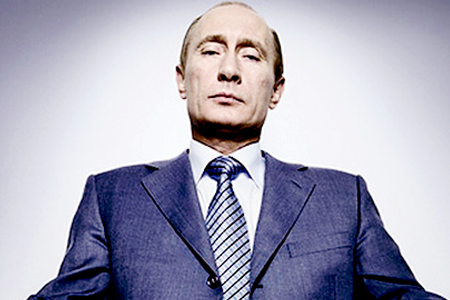Russian Parliament Approves WEB CENSORSHIP LAW. Putin Cackles.
One of the neatest things last year, in a really horrifying and troubling way, is how Putin pretty much stole an election last year and all of us assholes over here were like “Oh, Dancing With The Stars? Awesome!” and paid no attention. Hey man, we got priorities. Wonder how much this will register on our collective radar.
The Verge:
Russia’s parliament this week passed a controversial bill that would allow the government to unilaterally blacklist and shut down any website deemed illegal. Draft bill 89417-6, an amendment to Russia’s Act for Information, targets any sites hosting child pornography, images of sexually abused children, or any materials that would encourage minors to use drugs or commit suicide. If signed into law by President Vladimir Putin, the amendment would create a federal agency charged with policing the web and maintaining a blacklist of banned sites.
The proposed legislation has come under fire from civil rights activists and internet service providers, who see it as a direct threat to free speech and a slippery slope to overt government censorship. Earlier this week, Wikipedia, shut down its Russian-language website in protest, imploring users to join the fight against the amendment. Russian search engine Yandex and social networking site Vkontakte also protestedagainst the legislation, arguing that it would threaten the existence of a free and open internet.
These efforts didn’t succeed in halting the bill’s march through the State Duma, though they may have forced the government to soften its stance a bit. An earlier version of the amendment called for a ban on any “harmful information” — a vague description that many pointed to as a major loophole for the government to exploit. This wording was stripped from the version that passed on Wednesday, and was replaced with a more specific list of offending content.
Yet this concession hasn’t done much to quell the law’s detractors, who argue that it would still set a dangerous precedent for future regulation. Prime Minister and former President Dmitry Medvedev acknowledged the need for an open internet when speaking to reporters on Wednesday, but insisted that this freedom must be balanced against user safety:
“The Internet must be free. Secondly, it should be regulated by a set of rules, which mankind has yet to work out, and it’s a very difficult process because we cannot regulate everything, nor can we leave [the Internet] outside the legal realm. Thirdly, the people’s basic rights and freedoms must be upheld, including the right to information on the one hand and the right to be protected against harmful content on the other hand.”
The bill must now pass the country’s upper house, the Federation Council of Russia, before heading to President Putin’s desk for ratification. Russian media report that the law could go into effect as early as January 2013.
TL;DR: it’s all going downhill over thurr.




